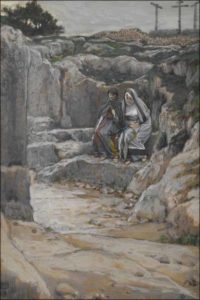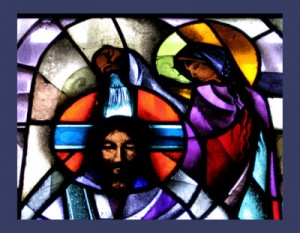Women of Holy Week: At the Cross & Tomb

The women of Holy Week frame the Passion of Jesus in the Gospel of Mark. Mark’s Passion Narrative began in chapter 14 with the female prophet who anointed Jesus as king and prepared him for his burial. Mark’s Passion ends with Mary Magdalene, Mary the mother of James and Joses, Salome, and “many other women who had come up with him to Jerusalem” bearing witness at the cross, and the two Marys holding vigil in front of the tomb. The stories of women embrace Jesus’ betrayal, arrest, denial, trial, and crucifixion. They followed “him and ministered to him when he was in Galilee,” and they followed him to Jerusalem (Mark 15:41).
Women were watching from a distance. Among them were Mary Magdalene, Mary the mother of James the younger and of Joses, and Salome. They had followed him and ministered to him when he was in Galilee. Many other women who had come up with him to Jerusalem were also there. That evening, because it was the Preparation Day (that is, the day before the Sabbath), Joseph of Arimathea came. He was a prominent council member who was also looking forward to the reign of Godde. He dared to go to Pilate and asked for Jesus’ body. Pilate was amazed that he might already be dead. He called the centurion and asked him whether Jesus had been dead long. When he confirmed it with the centurion, he gave the body to Joseph. He bought a linen cloth, took down the body, wrapped it in the linen cloth, and laid it in a tomb that had been cut from rock. He rolled a stone to the door of the tomb. Mary Magdalene and Joses’ mother Mary saw where he was laid (Mark 15:40-47, New Testament: Divine Feminine Version [DFV]).
At the Cross
In Mark those who follow Jesus are disciples. Minister comes from the Greek word group from diakonos, which means to serve. Diakonos is the word we get our word deacon from. Originally meaning “table service,” in the New Testament it became a specialized term for ministers of the Word and Eucharist. Mark uses minister when the angels ministered to Jesus after his temptation and when Peter’s mother-in-law ministered to Jesus after he healed her. Jesus used minister when he said “the Son of Woman came not to be served but to serve, and to give his life to liberate many” in Mark 10:45 (DFV).
The only time serve or minister is used for a man in The Gospel of Mark it describes Jesus. The other times the words are used they refer to angels or women. Elizabeth Struthers Malbon notes “Not only does Jesus take up women’s work, but women take up Jesus’ work. Women, from near the bottom of the hierarchy of power, have served and remained faithful followers to the end–although even they are ‘looking on from afar’….It is striking that Mark chooses to emphasize the presence of women followers in the absence of the male disciples at the crucial moment of Jesus’ death. Those with power can learn from those with less power” (“Gospel of Mark,” Women’s Bible Commentary, 491).
At the Tomb
Mary Magdalene, Mary, Salome, and the other women continued to faithfully minister to Jesus until the end. The women of Holy Week did not run away, they did not hide. Even if it was at a distance, they stayed with Jesus. They bore witness to his death, and they made sure he did not die alone. Mary Magdalene and Mary watched Joseph of Arimathea bury Jesus then remained at the tomb holding vigil. On Sunday morning they would be the first ones back at the tomb to finish anointing Jesus’ body for burial. We come full circle: at the beginning of the Passion Narrative the female prophet anointed Jesus to prepare him for the days ahead, and now Mary Magdalene and the other women who followed Jesus from Galilee now come to finish anointing Jesus’ body.
God rewarded them for their tenacity, perseverance, and faithfulness: they are the first to hear of the resurrection and see the risen Jesus. As they bore witness to the death and burial of Jesus, they now bear witness to the resurrection of Christ. The messenger at the tomb commissioned to tell the rest of the disciples that God has raised Jesus from the dead.
It is time for the church to stop overlooking the women of Holy Week, and to tell their stories in the context of Holy Week. These women show what Christ-like service looks like. Unlike the male disciples, they did not let their own ambitions blind them to Jesus’ teaching that he would die. They listened and understood. They ministered to him, and they bore witness. The women of Holy Week did not leave him alone during his darkest hours. The church needs to recognize and praise these women for their great faithfulness instead of pushing them into the shadows and forgetting them.
The is part two of my Holy Week series on The Women of Holy Week. The first post on The Widow and Prophet can be read here.

